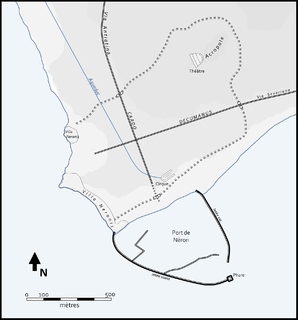
Antium was an ancient coastal town in Latium, south of Rome. An oppidum was founded by people of Latial culture, then it was the main stronghold of the Volsci people until it was conquered by the Romans.
Agrarian laws were laws among the Romans regulating the division of the public lands, or ager publicus. In its broader definition, it can also refer to the agricultural laws relating to peasants and husbandmen, or to the general farming class of people of any society.
Quintus Fabius Vibulanus, son of Marcus Fabius Vibulanus, was consul of the Roman Republic and one of the second set of decemviri.
The gens Verginia or Virginia was a prominent family at ancient Rome, which from an early period was divided into patrician and plebeian branches. The gens was of great antiquity, and frequently filled the highest honors of the state during the early years of the Republic. The first of the family who obtained the consulship was Opiter Verginius Tricostus in 502 BC, the seventh year of the Republic. The plebeian members of the family were also numbered amongst the early tribunes of the people.
Titus Verginius Tricostus Caeliomontanus was a Roman statesman who served as Consul in 496 BC. He was probably the (older) brother of Aulus Verginius Tricostus Caeliomontanus, consul in 494 BC.
Aulus Verginius Tricostus Caeliomontanus was a Roman Republican politician and general of the gens Verginia. He served as a Roman consul in 494 BC together with Titus Veturius Geminus Cicurinus.
Titus Quinctius Capitolinus Barbatus was a Roman statesman and general who served as consul six times. Titus Quinctius was a member of the gens Quinctia, one of the oldest patrician families in Rome.
Servius Sulpicius Camerinus Cornutus was a Roman politician in the 5th century BC, consul in 461 BC and decemvir in 451 BC.
Titus Veturius Geminus Cicurinus was a Roman politician of the 5th century BC, consul in 462 BC and maybe decemvir in 451 BC.
Titus Antonius Merenda was a Roman politician, and decemvir from 450 to 449 BC.
Marcus Cornelius Maluginensis was a Roman politician and member of the Second Decemvirate in 450 and 449 BC.
Gaius Horatius Pulvillus was a Roman politician during the 5th century BC, and was consul in 477 and 457 BC.
Spurius Furius Medullinus Fusus was a Roman politician in the 5th century BC, and was consul in 464 BC, and consul suffect in 453 BC.
Publius Furius Medullinus Fusus was a Roman politician during the 5th century BC, and was consul in 472 BC.
Tiberius Aemilius Mamercus was a Roman senator active in the fifth century BC. He was consul in 470 and 467 BC.
Titus Numicius Priscus was a Roman politician active in the fifth century BC and was consul in 469 BC.
Publius Servilius Priscus was a Roman senator active in the fifth century BC and consul in 463 BC.
Lucius Lucretius Tricipitinus was a Roman senator in the fifth century BC, and was consul with Titus Veturius Geminus Cicurinus in 462 BC.
Spurius Verginius Tricostus Caeliomontanus was a Roman consul and a Roman politician of the 5th century BC. There was no recorded date of his birth and death though there was a record his term of office from 456 BC to 455 BC. During his time in office he saw continued division between plebs and patrician.
Titus Verginius Tricostus Caeliomontanus was consul of the Roman Republic in 448 BC with Lars Herminius Aquilinus. Little is known about his life.